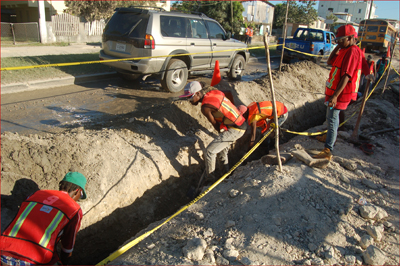![]() Hundreds of Belize City residents will have the opportunity to earn some money over the next 12 months as Cisco Construction Limited executes an important feature of Government’s Southside Rejuvenation Project – the paving of Central American Boulevard. Through an agreement with OPEC, the Government of Belize will spend over .7 million on the concreting of Central American Boulevard from Belcan Bridge to its intersection with Caesar Ridge Road. Those who bid for the contract were mindful of Government’s special emphasis on making the project as labour intensive as possible in order to create the maximum amount of employment opportunities. Cisco Construction Limited submitted the most favourable bid and was awarded the contract.
Hundreds of Belize City residents will have the opportunity to earn some money over the next 12 months as Cisco Construction Limited executes an important feature of Government’s Southside Rejuvenation Project – the paving of Central American Boulevard. Through an agreement with OPEC, the Government of Belize will spend over .7 million on the concreting of Central American Boulevard from Belcan Bridge to its intersection with Caesar Ridge Road. Those who bid for the contract were mindful of Government’s special emphasis on making the project as labour intensive as possible in order to create the maximum amount of employment opportunities. Cisco Construction Limited submitted the most favourable bid and was awarded the contract.
The first phase of the project started on Monday, February 17th, with the trenching of the section of the street from Belcan Bridge to Mahogany Street. It is a job that with heavy machines would require 5 men to complete; however, almost 30 men are working in that area with pickaxes and shovels. The men are trenching the side of the street for the utility companies to get in and adjust their lines for the concreting of the street. The second section being trenched is from the roundabout junction with George Price Highway to Iguana Street.
There are 35 people working on the section from the George Price Highway to Iguana Street. This team features a special crew of a dozen women who have been working just as hard as their male counterparts. John Pollard is the leader of the group. He says that he is impressed with the ladies’ spirit. Just as the men, they are broken down into groups of three or four and given an area of 40 to 60 feet to trench per day. The Highway to Iguana Street group has performed exceptionally well. In just over one day they had trenched over a 400 feet stretch using pickaxes and shovels to dig and clear an area 2 feet wide by 3 feet deep. The women notice the stares they receive from motorists and pedestrians. One young lady says she believes most people think they cannot handle the work. However, they are encouraged every time someone passes by and stops to offer a bottle or bag of water. They do not deny that the work is tiring but they want to assure everyone that they can work as hard as or harder than any of the men on the site. The women got to work at around 7 a.m. on Wednesday, February 26th, and their team leader made a commitment to work until at least 6 p.m. When the pace seems to be slowing she jokes with the other ladies that if they don’t step it up they might have to stay until 9 p.m. While they were working one man passed and asked, “Why they have you all working so hard?” One of the women looked up from down in the trench and replied, “How yo mean; money de fuh mek and pikny de fuh feed.” Another said, “Nobody wah give yo nothing mi bredda. Soh yo haffu work fuh what yo need.” The men enjoy having the women around as well. One of the older men in the group said, “They not only lighten up the mood but they also share their water.” He continued, “They work hard and they are alright with me.”
The project is expected to be completed within 10 to 12 months.




